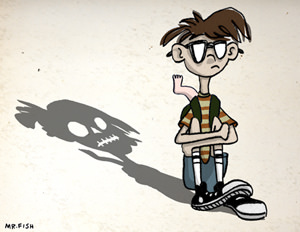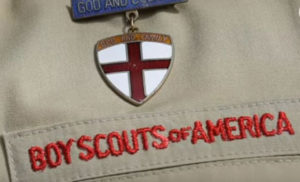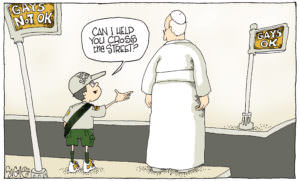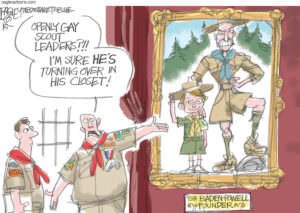Phuck Is Not a Four-Letter Word
His name was Sam, no last name, and he wore no pants. He was lying on my little brother’s bed in a filthy orange T-shirt staring up at the ceiling, knees slightly bent, with blue eyes and curly blond hair and small pink lips that were frozen in a strange suckling of the air.My mother was the first dead person I’d ever seen up close.
My mother was the first dead person I’d ever seen up close.
This was in 2007, and I was in Maine when she died all of a sudden in New Jersey. Then, two days later, the funeral home called my brother to tell him that somebody needed to positively identify her body before the cremation, which struck me as odd.
While I could imagine the lawsuit that a mortuary was guarding against with just such a policy — namely that a family was entitled to some reassurance that it would be receiving the remains of a deceased loved one and not the remains of a complete stranger — I wondered how a signature on a piece of paper could really guarantee the identity of somebody’s ashes. Unless you were there to actually strike the match yourself and slide the body headlong into the flames, you’d never know for sure that you were getting the remains of your dead relative afterwards — or even the remains of a person. After all, practically everything on the planet burns and, given the commonality of ashes, you could just as easily be getting an incinerated chest of drawers as half a horse and never know the difference. So why pretend that signing a piece of paper would guard against sketchy business practices? Common sense, particularly when bolstered by the evidence offered by the breach-of-contract cases forever overflowing every court docket in America, led to the obvious conclusion that paperwork guaranteed absolutely nothing.
So why would my brother even want to drive down to New Jersey to look at his freshly dead mother and then to sign a form saying that it was her? Why allow bureaucratic red tape to take precedence over the truth of the situation?
Of course, in the end, I told my brother to wait for me, that I’d go with him to the funeral home and help him make the positive ID and wait while he signed the proper forms, figuring that having our mother turned to dust and laid to rest in a timely fashion was slightly more important than me hijacking her coffin and turning it into a soap box, knowing that it could never succeed as such so long as she was in it.
Ironically, it was just such a disdain for genteel acquiescence to the dominant culture that our mother instilled in all of her children and made us self-made monkey wrenches all too willing to hurl ourselves into the cogs of what public opinion deemed as normal behavior. We learned to view convention as a total lack of imagination, and dissent as proof of our superiority, the evidence for which was not in any keenly devised set of alternatives to the commonly revered traditions of the day, but rather was in the visceral and decidedly nonintellectual joy that came from wearing sneakers to the ball or pissing on the countess’ good china. No doubt, such willful discordance, while being a most outstanding ingredient in the tastiest examples of joke-making, eventually revealed itself to be an all too destructive mental sleight of hand. For my family, it confused us all into assuming that by mocking the bogus elements of etiquette we must be arguing from a contrary point of view, which, according to the law of opposites, had to be from a point of view that was non-bogus and virtuous and absolutely correct.
But, of course, condemning the light is by no means the best way to argue in favor of the dark, just as celebrating the arrival of the dawn is poor proof that nightfall is a tragedy. Standing there looking down at my 64-year-old mother with her mouth glued shut, I was able to all at once thank her for blessing me with such a rigorous distrust of convention — my whole career as a political cartoonist having come from a healthy skepticism of Establishment values — while, at the same time, damn her for allowing her own distrust of convention to become pervasive enough to cause defiance of doctors, nutritionists and the warning labels on vodka bottles.
I thought back to a summer day in 1975.
His name was Sam, no last name, and he wore no pants. He was lying on my little brother’s bed in a filthy orange T-shirt staring up at the ceiling, knees slightly bent, with blue eyes and curly blond hair and small pink lips that were frozen in a strange suckling of the air, almost as if he were unable to wean himself from the invisible teat of some invisible God offering eternal invisibility to anyone willing to praise something that gave no real evidence that it was even ever there to begin with. Similarly, outside in the Ford Falcon station wagon that was idling in the driveway, my mother screwed a fresh cigarette like a new light bulb for a crappy idea into the furious sphincter of her lips, which were pulled into the familiar pucker that she’d been using to kiss her own suicide by heart disease and lung cancer ever since she was old enough to misapply her affection. Lighting the tip and feeling as if sitting in her driveway with the motor running was too telling a life metaphor for her to have to accept gracefully, she began pounding the car horn, effectively forcing the ghost of her aggravation up my 9-year-old ass like I was an empty puppet needing her hand to help me find the canteen that I’d need to stay alive during the day hike that I’d be taking with 20 other Boy Scouts through the New Jersey woods that afternoon.
For the fourth time in a row the screen door at the front of the house opened and then slammed shut and in ran my little brother, Daryl, to shout at me from the living room that our mother was beginning to place words around my name that he’d only heard our father place around rusted lug nuts just before throwing his wrench and disappearing for an hour to drink a six-pack and to massage the tits out of his masculinity. “Mom’s saying focket again!” he said.
“Tell her that I can’t find my focking canteen and to quit it with that goddamn horn already! I’m coming!” I hollered, momentarily forgetting that a 6-year-old could often be as reliable a form of message delivery as your delivering the message, word for word, yourself. “Wait!” I said, to the sound of the screen door opening and then slamming shut again, followed by a moment of silence and then, if it was possible, blasts from the car horn pressed hard into shapes designed to enter my eye sockets like snowballs, Pow! Pow! My fists clenched around the emptiness in my hands as desperately as if gripping the rungs on an unsteady ladder. Walking back across my bedroom to kick, for the millionth time in a row, at the exploded sleeping bag and tent that had been dragged from the hall closet and heaped in the corner, I considered going into the kitchen and grabbing a couple cans of Dr Pepper and shoving them into my backpack. Then I remembered the NO CARBONATED DRINKS! rule, which, according to my brother, had been implemented after his friend Hugo Jaffee, after carrying a liter of Mountain Dew over rocky terrain in the Poconos, opened the bottle and ended up spending the better part of the following autumn in a physical therapy program having his part painfully retrained to appear on the proper side of his head.
Figuring fuck it, I flumped down onto my little brother’s bed, accidentally sitting on Sam, forcing a stream of stale tap water to arc majestically into the air from the tiny piss hole at the tip of his cashew-sized shaft. As triumphantly as a choir-led amen at the close of a prayer, the stream rose and fell beside me like a ribbon loosened and flung from a virgin’s dress.
I was saved.
None of the other Boy Scouts seemed to notice, or at least they didn’t seem to care, that there was a toy baby leg protruding from the top flap of my backpack. Sure, I’d gotten to the trail late and had to run about two miles to catch up with everybody else in my troop and, sure, nobody talked to me when I caught up with them because nobody in the troop liked me, but you’d think that at least the scoutmaster, Mr. Jinx, would feel obligated to say something to me after witnessing me burst through a grove of trees choking and spitting on my own exhaustion like a werewolf. Then again, I thought back to the beginning of the month when Podgie Benigno, who was the hairiest 11-year-old that I’d ever seen in my life, while rubbing two sticks together furiously for 45 minutes to start a campfire for his cooking merit badge, had his elbows catch fire and how Mr. Jinx, when asked where the first aid kit was, suggested, without getting out of his beach chair or putting down his gin and tonic, that we respect the significance of the cooking merit badge and honor its intent by eating Podgie’s arms. In essence, Mr. Jinx was the sort of absolute sonuvabitch that lazy parents revered, not because he completed the parenting that they, the parents, were too lazy to commit to, but rather because he justified their disregard for the well-being of their sons by being a shitty parent to them as well. It was Jinx’s job to turn little boys into little men since nurturing them as adolescents required patience, compassion and something brighter than a dimwit.
With Sam’s naked leg sticking out of my backpack and a growing concern that I might never find the privacy necessary for me to drink soda from him like a Saigon whore, I fell in with the herd of 20 other hikers and started walking. Having interrupted no conversation with my arrival, none continued, eyes meeting eyes only as confirmation that I was something to be mentally stepped around. It was then that I considered the virtue of camaraderie over isolation. After all, it was during long stretches of self-imposed mental exile without the distraction of other voices when men were forced into conversations with themselves and faced with the terrifying possibility that they were not worth knowing.
I remembered reading in school about dog sled racers in the Alaskan Iditarod and how they frequently suffered hallucinations as a result of their isolation, their brains thrown into sudden panic no doubt at the realization that they were spending the best years of their lives riding in what amounted to a shopping cart on skis behind a pack of dogs slaphappy enough to recognize the word Mush! as an excuse to run headlong into the woods, their eyes like pinwheels. Of course, any brain faced with such a bizarre portrait of itself will attempt to create an entirely different reality in which to place itself, damning the one that it’s actually in. I feared that I might be beginning this hike with a terrific personality and ending it with absolutely none to speak of, having ingested it during the course of the day like a box of Cracker Jack, my self-destruction predicated on the false notion that there was a prize to be claimed at the center of my soul.
It was then that Mr. Jinx turned around to face us and command, “Canteen/piss break, five minutes!” Dutifully responding like pennies released from a fist, Scouts fanned out in all directions, rolling behind trees and boulders and shrubs and into gullies to pour scant amounts of ammonia and lemonade into tiny foam puddles before regrouping themselves into grumbling pairs and threesomes and quartets to sit and pull canteens from their packs and to upend them against their lips. Finding a tree of my own, one too skinny to provide complete invisibility, I took 49 seconds to take a three-second piss and to shake absolutely nothing off my very modest modesty, contemplating the whole time how I was going to get Sam’s plastic meatus out of my backpack and into my mouth without drawing the attention of all the normal kids around me, figuring that lynch mobs weren’t so much rehearsed as they were spontaneously inspired.
“Well,” I whispered to my brother, standing three feet away from the lifeless doll that was our mother, “that’s her, all right.” He agreed with a whispered yep. Then, with neither one of us trusting the authenticity of the oh-so-popular five stages of grief, we stood dry-eyed and said nothing more, him because he wanted to remember our mother looking so much less agonized than she had appeared to him three days earlier and me because I believed, with absolute certainty, that if I made a sound I’d wake her up, which would embarrass both of us, each overcome with average tears and made ordinary by a warm and all-too-comforting embrace.
Your support matters…Independent journalism is under threat and overshadowed by heavily funded mainstream media.
You can help level the playing field. Become a member.
Your tax-deductible contribution keeps us digging beneath the headlines to give you thought-provoking, investigative reporting and analysis that unearths what's really happening- without compromise.
Give today to support our courageous, independent journalists.





You need to be a supporter to comment.
There are currently no responses to this article.
Be the first to respond.